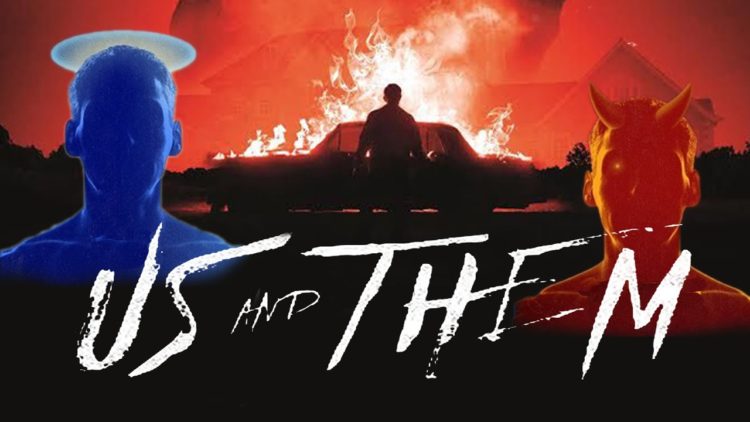Faith doesn’t teach hate: We have the Choice to Accept or Hate Differences
Abid Ullah Jan
Today we are going to talk about how we are hard-wired to favor those who are familiar to us over strangers; how this leads to serious problems in society and how we have the choice to hate or accept differences.
Neuroscience has confirmed that we are naturally predisposed to notice differences and similarities. Children, as young as 5-10-month-old, recognize and fear strangers.
And the speed, with which we detect Us-and-Them differences, is really stunning.
Stick someone in a “functional MRI”; flash up pictures of faces for 50 milliseconds — barely at the level of detection. With even such minimal exposure, the brain processes faces of Thems remarkably differently than Us-es.
When we flash up the face of someone of a different race, there is preferential activation of the amygdala within a fraction of a second. It is a brain region associated with fear, anxiety, and aggression.
It’s like being frightened instantly upon seeing a few Muslim men in their Islamic dress, as they are widely portrayed as a terrorist.
Similarly, the feeling of ‘us’ is due to the activation of the fusiform cortex. It’s like the feeling of a person in a foreign country when he/she meets another person of the same race or nationality.
So this implicit preference for our in-group results in denigrating Thems. We do so in a variety of ways ranging from the minute micro-aggression to extreme hate and bloodbaths of savagery.
We regularly decide what is inferior about Them based on pure emotion, followed by rationalizations that we mistake for rationality.
Since we don’t have anything personal against Them, the easiest way is to justify our hatred by pointing fingers to their faith – not realizing that our respective belief systems have nothing to do with our hatred.
It’s all about the misunderstanding, misinterpretation and the choices we make that turn us either into the most kind of all souls or the worst kind of hate mongers. Some of us would strive to kill all infidels and others would work to ban all Muslims. Both are simplistic but nihilistic solutions inspired by hatred born out of our us-and-them dichotomy.
Media and academia have a key role in consolidating such hate-based mindsets. As an example, in the anti-Muslim camp, even the ones who pretend to be neutral analysts argue that Islam has a history of violence, but it’s also a peaceful religion.
Well, what they fail to tell us is, firstly, how can a peaceful religion have a history of violence? And secondly, how could there be no other factors for violence in Islam’s history other than its teachings?
These efforts to associate Islam with violence ignore the fact that Islam never justified violence for imposing religion, gaining territory or seeking material success. Islam has nothing to do with violence employed to achieve such goals.
So the argument that ISLAM has a history of violence doesn’t stand the test of factual analysis.
If the reason for associating Islam with violence these days, is the violent crimes of a tiny fraction of Muslims, then many Muslims are engaged in so many other non-violent crimes as well. Does it mean Islam is a motivating factor for that as well?
Well, Muslims don’t engage in violence and extremism because of Islamic teachings. Period. Some might argue, “But there are violent passages in the Quran.”
Yes, there are.
However, quoting verses from the Quran to prove Islam’s association with violence is problematic for several reasons.
Quoting isolated verses from the Quran clearly misses the context in which they are revealed.
The problem is not that the Quran has injunctions that call to violence – because – the same Quran also has verses that call to peace.
The problem actually is a misinterpretation and out of context presentation of some verses.
The peaceful majority of Muslims and a tiny fraction of violent individuals among them are not equally justified in their interpretation of the Quran.
It is deceiving to put isolated verses about violence and peace side by side and claim, “for some Muslims, the peace of God is through his sword; for others, it is found in his unbounded mercy.” The reason: Verse 9:14 is isolated and presented out of context here.
If you read other verses in this chain, you will see that the command is actually for self-defense in a particular situation – not an irrational call to indiscriminate violence against innocent people.
In total contrast, the call to peace in verse 25:63 is universal for all times – describing how true believers must live their lives.
The servants of the All-merciful are those who walk in the earth modestly and who, when the ignorant address them, say, ‘Peace’. (Q 25:63)
Fight them, and God will chastise them at your hands and degrade them, and He will help you against them, and bring healing to the breasts of a people who believe. (Q 9:14)
(Red text doesn’t require narration)
All three monotheistic religions have references in their religious texts to both violence and peace. However, that doesn’t make all believers violent extremists.
Similarly, peaceful verses in their religious texts do not guarantee that ALL of its followers would not be human. Instead, all of them would have the same capacity, the same understanding, and the same self-control to be perfect human beings – never making any mistakes. That’s impossible.
Humans do make mistakes regardless of their religious beliefs. Humans do go to extremes in misunderstanding others. They do regret and they do repent as long as they don’t have mental health issues. Blaming their religion for their predisposition to favor in-group, however, is naïve.
Violence isn’t new to human history or religions, nor is it a phenomenon solely attached to Muslims or their religious history alone.
All kinds of isms and political experiments have a track record of fanaticism and indiscriminate violence.
Similarly, reading of religious text also relies heavily on human interpretation. Not all Jews, Muslims and Christians are violent extremists.
To put it mildly, “The world is bleeding to death through misunderstanding.”
Of course “it can never be right to kill in the name of God”, but it should also be dawning on all peoples that it is time to let go of pretensions while committing crimes against humanity that they know the will of God.
This point directly underlines Darren Aronofsky’s film portrayal of the biblical story of Noah. Whether the biblical story is twisted or not, it communicates an important message: We have the Choice. And to make the right choice we have been gifted with intellect to distinguish between right and wrong.
In the film, Noah is forced to wrestle with his deepest self to understand and make decisions that will affect the lives of others.
When Noah is about to kill the twin daughters born to his daughter-in-law – because he thinks it is the will of God – at length, he cannot. He cannot find it in himself to perform such an act.
This is a timely reminder that sometimes we make mistakes due to our natural predisposition, and sometimes we make the right choices. And that is what is at the heart of any debate on religious content and its interpretation: the choices we make.
For example, rather than listening to the claims and counter-claims about what “authentic” Islam really stands for, we might be better to pay more attention to how advocates of their faith choose to live their lives.
That way, it might be easier to avoid making assumptions about what the religion might mean, and instead focus more on how the faithful live.
The enemy of peace is not religion or those we consider as them, but those who nurture hate, and pursue acts of terror and violence in the name of religion, or any other shade of ism or way of life.

